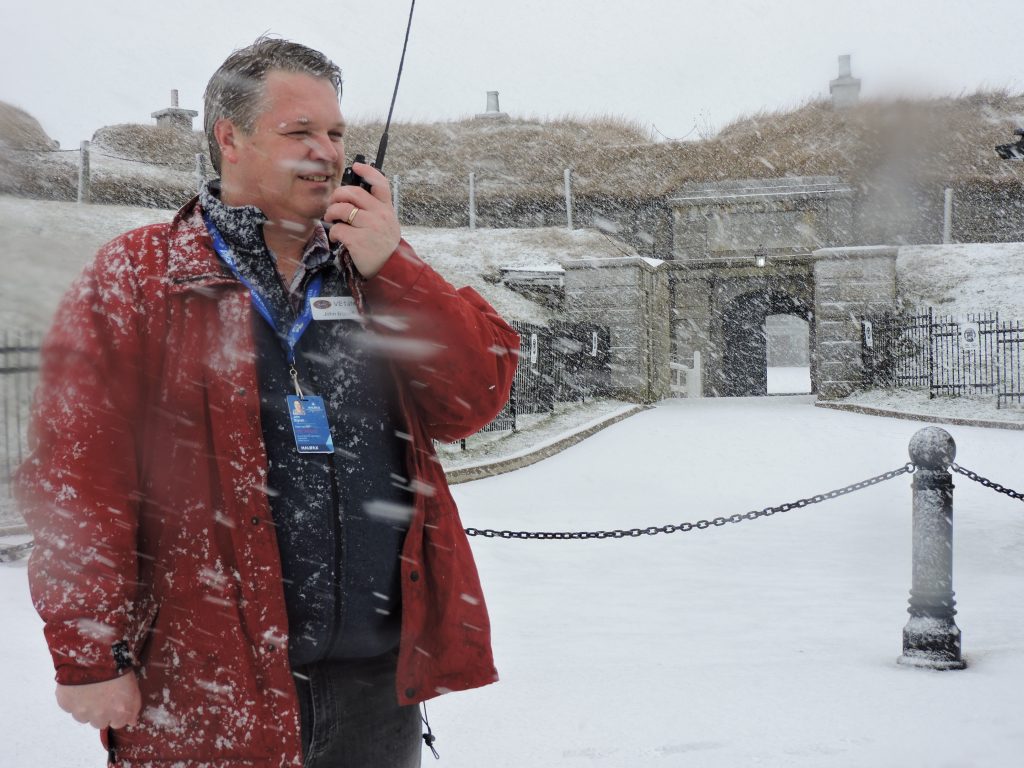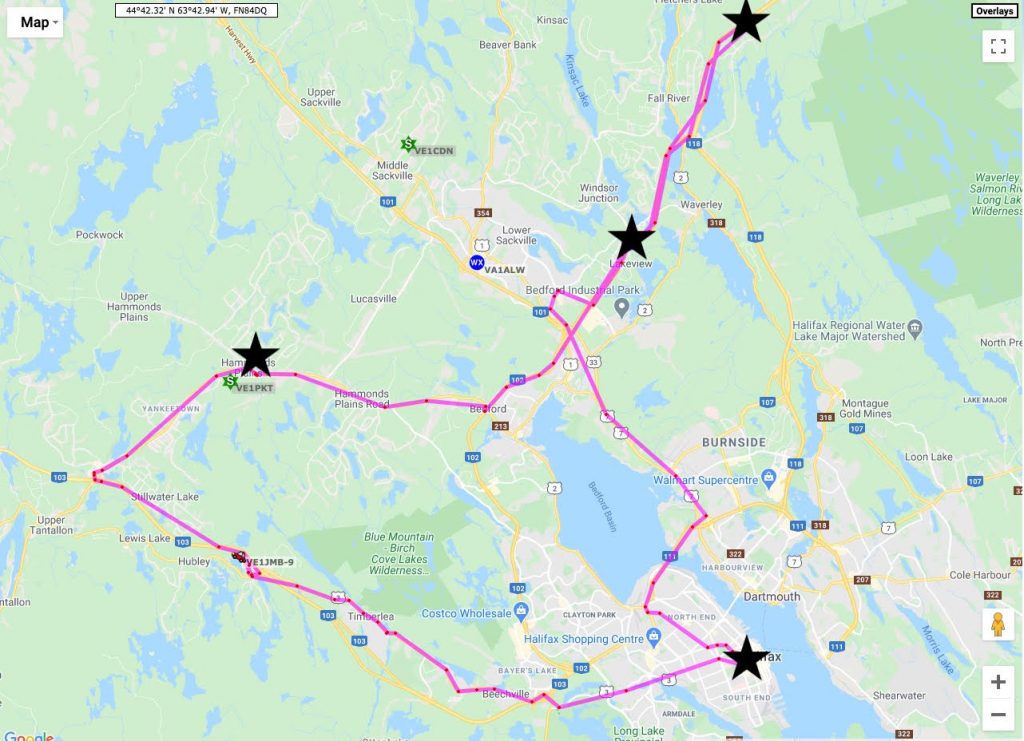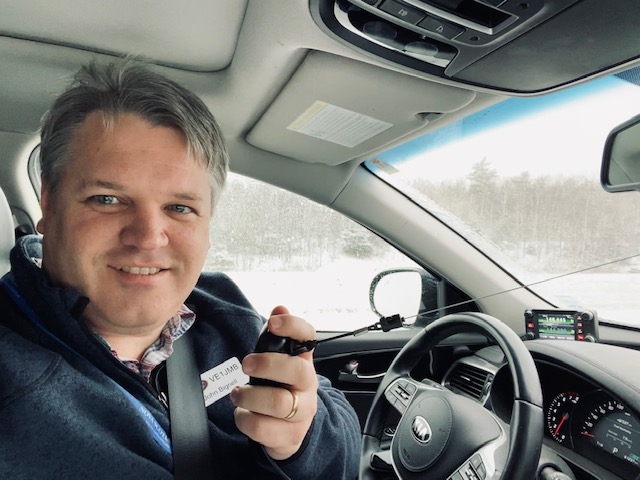Get On The Air” Contest is a Huge Success in Halifax!
On January 6th, 2021, Amateur radio operators waited until the noon gun fired before the “Get on the Air!” 2 Metre Simplex Challenge started. This 12-pound gun is a tribute to Halifax’s history as a major British military stronghold, a tradition that has been going on for over 164 years at the downtown fort.

As the thundering roar of the gun fell silent, I cautiously turned on my radio. I feared that the bands would silent, or I would only hear the Halifax Amateur Radio Club (HARC) committee members that had worked hard to set up this event calling CQ.
For the past couple of months, HARC, like other clubs throughout Canada, has been finding it hard to gather, meet, or plan events as a group. Covid-19 has shut down many social group activities and limited them to online conference calls. Our HARC members wanted to do more than meet online, so in the Fall of 2020, a subcommittee came together intending to overcome the Covid-19 challenges. The HARC Board of Directors tasked these hams to come up with a solution to promote Ham radio and engage our membership. The HARC Events Committee suggested the idea to host short afternoon events on the first of the month, which would be fun but also provide opportunities for informational amateur radio education.
The committee hoped to challenge members that may have never taken part in a contest to “Get on the Air!” without the pressure of dealing with the larger contesting events that are normally found on HF. Our first goal with this contest was to get as many hams filling the bands in a friendly event that would be fun and challenging to both new and old amateur radio operators.
From past contests, we have learned that some club members find these events intimidating and will shy away from taking part while others will simply avoid such events because the airwaves are monopolized by the contest participants. Competitive operators, on the other hand, thoroughly enjoy these events getting caught up in calling CQ, recording contacts and digging through radio pile-ups. By creating a contest targeted to the HARC club members, we were able to create an opportunity for those that normally avoid contests to have fun with their peers.

To my delight, the 2-metre traffic on simplex filled the airwaves. People from around the city and beyond were trying to connect. As I sat on top of the Halifax Citadel National Historic Site and watched the smoke drift over the fort, it was not lost on me that I could almost see in the distance the Camperdown Signal Station, which was part of a communication network built by Prince Edward Duke of Kent in 1797. Although the method of communication may continue to change over time, just like the soldiers who over 224 years ago sent messages with canons and flags, we still understand the value of clear communication.
As the afternoon unfolded, we saw great value in having all members try calling CQ on the simplex frequency and working small pile-ups. We encouraged the operators to be clear when they spoke, using accurate terms and correct radio language, so that everyone involved in the task would understand what they were saying. Despite the relaxing atmosphere for this event, it allowed operators to practice their skills and overcome obstacles. For mobile and rover stations, it challenged them to move around the city and try different locations to see if they could improve their chances to catch these weaker signals in a storm.
Just before moving to another part of the city, I was approached by a Parks Canada staff member who seemed surprised to see me standing outside the historic site on this cold, windy and snow-filled day talking on my radio. When he approached and asked what I was doing, I explained to him about the HARC contest and the role ham radio plays in disaster or severe weather events. He quickly replied, with a tongue-in-cheek comment, “BREAKER. BREAKER. With iPhones and the internet, why would you even need walkie-talkies?”
At this point, I don’t think it would have mattered what I was going to say, it was lost on him what role amateur radio plays in our community. It was hard to get across that this event wasn’t just about getting people out talking on their radios, it was an informal test of our communities’ capabilities to exchange information; when all else has failed, amateur radio still works.

As the afternoon progressed, I noticed people began experimenting with their 2-metre gear. When someone couldn’t hear a contact that everyone else was able to hear on the channel, the radio operators began to troubleshoot. Much like we would if we had a break down in our telecommunication network, many offered suggestions and tips to help other hams make the QSOs by suggesting that they move to different spots in the city with less interference and higher ground. As much as it was a contest, the spirit of ham radio wasn’t lost.
To achieve success in this contest operators had to keep a logbook and record the call sign of the station, their location, power level and signal strength. What many may not have fully appreciated is the value of record-keeping in amateur radio. For a fun contest like ours, these logs are great personal notes of the event, people you connected with and your mobile location, if applicable. These logs operationally show a detailed record of the activity, which is a great habit to start early in ham radio contesting and more importantly, from a legal aspect, your logs are an invaluable tool in the event of an interference complaint.
At the time of writing this article, logs of the contest are being submitted and the HARC Events Committee is hard at work planning future outdoor events. By summertime, we hope to host an over-the-air crossword puzzle with ham radio basic exam questions. Participants will have to use Winlink or SSTV to get their crossword sheet and then be ready to answer questions sent over to the MAVCOM Repeater network here in Nova Scotia. The committee is also working on more traditional events like Foxhunts and SSVT contests to keep skills sharp and up to date while still having fun.
Originally punished in the Canada’s Amateur Radio Magazine February 2021-VOLUME 49 NUMBER 2
More coverage of the Halifax Event

